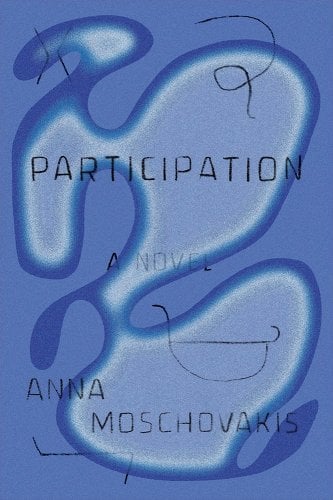Anna Moschovakis
Coffee House Press
by Joseph Houlihan
Poet, novelist, and translator Anna Moschovakis won the International Booker Prize in 2021 for her translation, from the French, of At Night All Blood is Black by David Diop. Her latest novel, Participation, also has a lot of “French” in it; possibly written as an echo of her previous novel, Eleanor, or the Rejection of Progress of Love (Coffee House Press, 2018), this new work offers a probing meditation on love. Fortunately, the book’s framing device cuts through any risk of it being overly sentimental.
Participation follows a narrator, E, as she vacillates between the gravity of two reading groups, Love and Anti-Love. E explains: “Anti-Love is not, to be fair, billed as Anti-Love. It’s billed variously as resistance, revolt, revolution. Sometimes it’s billed (tentatively or defiantly) as Self-Love.Love bills itself as itself, eponymous and proud.”
Following the Oulipo tradition of expanding through constraint, Moschovakis employs various experiments, letting the novel unspool through thoughts, fantasies, anecdotes, dialogues, and more. Moschovakis gives her characters from the reading groups letter-names without genders, as well: “This missive earned a single black heart from S, one of the members of Love I’d never met. I jolted when I saw their heart, then I liked it back.” The desire that expressed without gendered language ripples in interesting ways, energizing the description of a prelude to a kiss and dispatches from a live blog in the wake of a disaster. As the book accelerates towards its finish, there is increasing entropy and beautiful irresolution.
Throughout, Participation remains smart, frank, and sexy about its subject: “There is an abundance of emotion—enough years, enough fucks and near-fucks and pseudo-fucks, enough expectations unanswered because unheard or unsaid—and it is that abundance that is known: a partial knowing, as excess is always, paradoxically, partial.” This arch sexiness has the appeal of Marguerite Duras in The Lover or The Ravishing of Lol Stein.
As a poet, Moschovakis has effectively employed and interrogated axioms. She does the same in her fiction, animating the ideas in Participation with language. There is the notion of bodies constituted through exchange—“We absorb such unverifiable facts from conversation, and they become a part of us, they become us”—and she
describes mathematical intuitionism as a metaphor for communication: “Intuitionism is based on the idea that mathematics is a creation of the mind. The truth of a mathematical statement can only be conceived via a mental construction that proves it to be true, and the communication between mathematicians only serves as a means to create the same mental process in different minds.”
Of course, everybody does not occupy the same reality, and even as we describe the world, we can never describe the whole world. This tension, and the tension between love and anti-love, participation or non-participation, or how to live whenthere is no good way to live, is the central theme of the novel. This tension as it relates to love and desire is enunciated in ways that lead the reader to ponder what might be a “good enough” love.
Participation does not have quotes in the title, but one might well imagine them there. E is a material girl in a material world; she burns, she desires, and she dreams. Her fragmented transmissions ring a warning bell, and the result is affecting.
Click below to purchase this book through Bookshop and support your local independent bookstore:
Rain Taxi Online Edition Spring 2023 | © Rain Taxi, Inc. 2023

